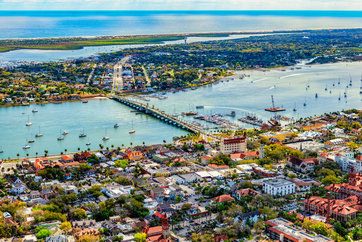Ep.1: Legends & Myths
Podcast by Mattison Hansen
[BED MUSIC]
Mattison: Hello. My name is Mattison Hansen, and this is the “Revealing Legends Podcast,” where I will be talking about local legends that stem from the nation’s oldest city – St. Augustine.
Before we start this series about historic heroes and tragedies, I want to apologize for any mispronounced names and words upfront. You’d think taking three semesters of Spanish in high school would have prepared me for this moment, but that’s not the case as you will learn.
[END BED MUSIC]
I am a senior at Flagler College, though I’ve lived in Florida my entire life, so looking in to St. Augustine legends are not unfamiliar to me. Living in a historic location like St. Augustine, my interest in the kind of stories that surround me stem from the numerous tours that go around spilling random facts and legends. But what is the truth behind those stories? That is what I will be discussing in this series.
In this episode, I’d like to give a general background on St. Augustine, as well as what the difference is between legends and myths. This way we are introduced to the overall topic of this podcast – St. Augustine legends.
Fifty-five years before the Pilgrims landed on Plymouth Rock, and forty-two years before the English colonized Jamestown, the Spanish established St. Augustine in 1565 – making it the nation’s first lasting settlement – and with it 455 years’ worth of legends and myths.
Beginning with the discovery of Florida, historians credit Juan Ponce de Leon with the discovery in 1513. The explorer claimed Florida for the Spanish Crown and named it Florida after the Easter season, known in Spanish as Pascua Florida.
In the following half-century, the Spanish government launched more than six expeditions attempting to settle Florida, all of which failed. This is partly because in 1564, French Huguenots succeeded in establishing a fort and colony near the mouth of the St. Johns River (now-a-day Jacksonville). This settlement posed a threat to the Spanish fleets that sailed the Gulf stream beside the east coast of Florida, carrying treasure from Central and South America to Spain.
Eventually, on September 8, 1565, Don Pedro Menendez de Aviles set foot on the shores of Florida, and in honor of the saint whose feast day fell on the day he first sighted land, Menendez named the colonial settlement St. Augustine.
Eventually, with fantastic military guidance and luck, Menendez removed the French garrison and proceeded to unite Spain’s authority on the northeast coast of Florida.
St. Augustine was to serve two purposes. One, as a military post, and secondly, a base for Catholic missionary settlements. Maintaining St. Augustine as a permanent military colony, however, was a enormous task. Without the courage, perseverance, and termination of the early settlers, it’s doubtful the community would have survived.
All cultures have stories passed down from generation to generation. These stories are made up of supernatural elements and contain characters that defy all logic and rules of nature. Both legends and myths can include death-defying stunts and heroes, but it creates confusion when trying to define what is a legend and what is a myth.
Legends are a historical account of real events and people from ancient times, though extremely exaggerated to the point where it now includes supernatural or extraordinary elements.
These narrations may have a little amount of supporting evidence, but it cannot be effectively verified. Legends are told to teach certain lessons of faith, trust, loyalty, and other virtues.
Examples of some legends include Helen of Troy, Robin Hood, and Atlantis.
On the other hand, myths are stories or tales that have been rooted in religion or folk beliefs of that time. The stories told were a way to represent or explain how the world came to be in its natural state, as well as natural phenomenons that occur in the world.
Myths usually involve gods, heroes and humans in various settings accomplishing supernatural feats. These tales could be elaborated accounts of historical events, used to justify a ritual or teach behavior morals. Myths are basically attempts to explain creation, divinity, religion, to account for natural phenomenons and to chronicle the adventure of heroes.
The key difference between legends and myths is that Legends are a narrative of actions performed by humans sometime in history; it’s a historical account of events and people from ancient time, meanwhile Myths are a story or tales that have been rooted in religion or folk beliefs of that time.
[BED MUSIC]
Mattison: I hope you found this episode informative, and I can’t wait to learn more about St. Augustine legends with you.
In the next episode, I will be discussing the legend of the Fountain of Youth, so until next time thank you for listening to “Legends Revealed,” and have a great rest of your day.
[END OF BED MUSIC]



Be the first to comment on "Legends Revealed: Legends & Myths"